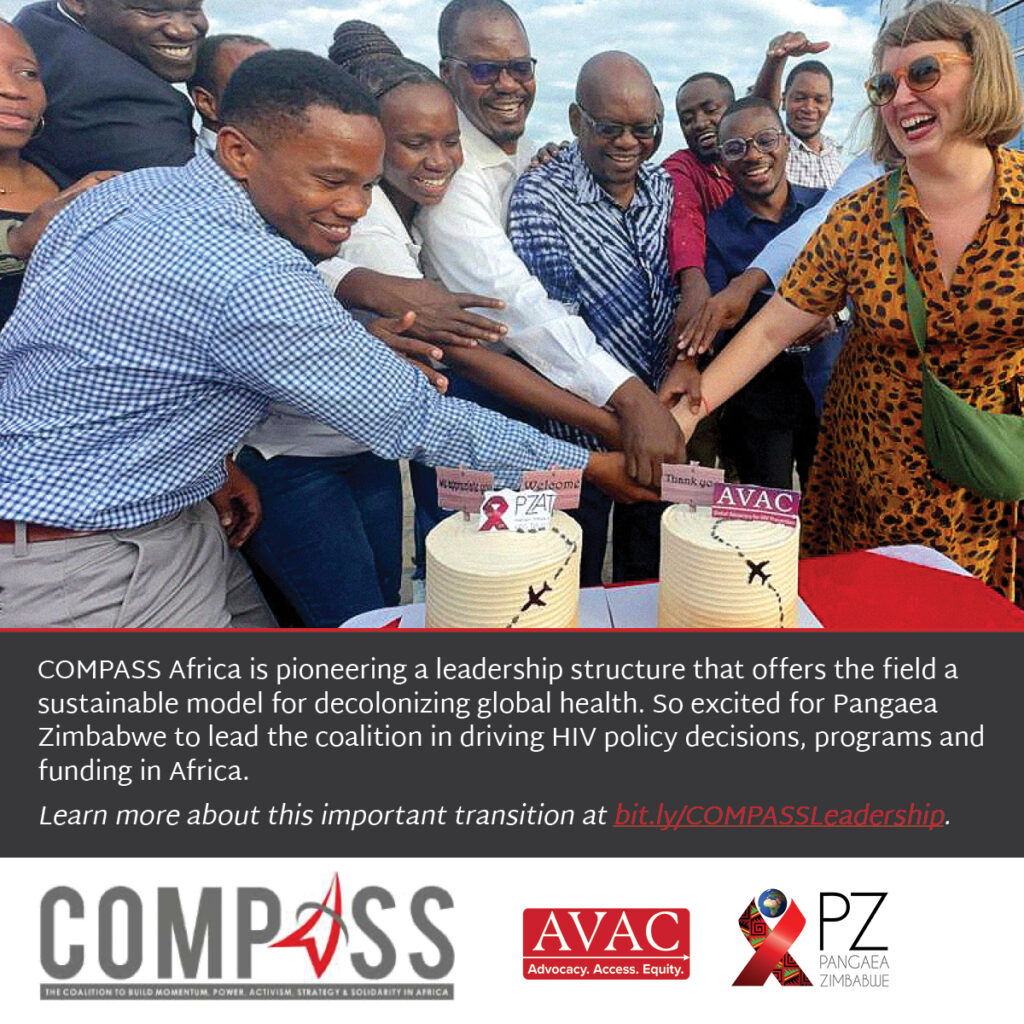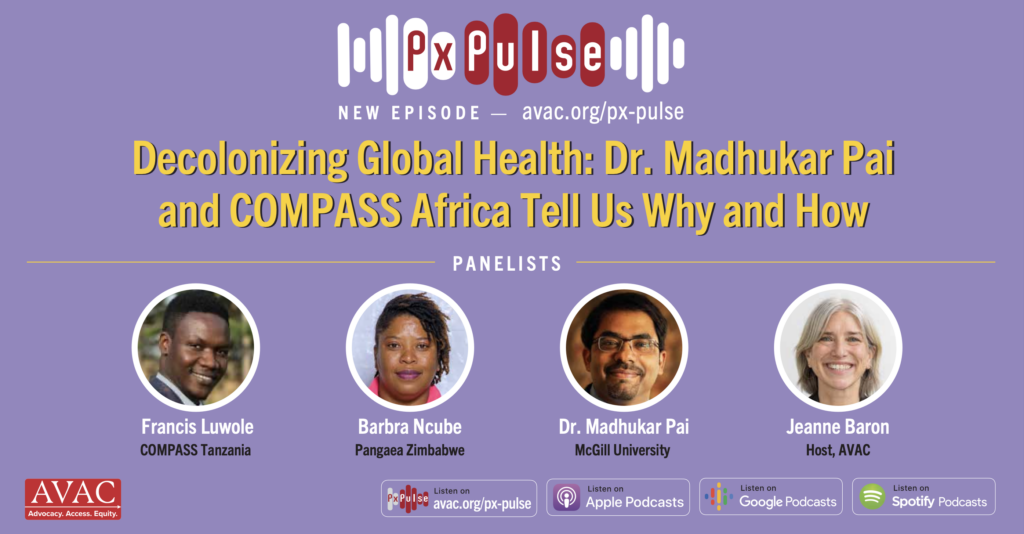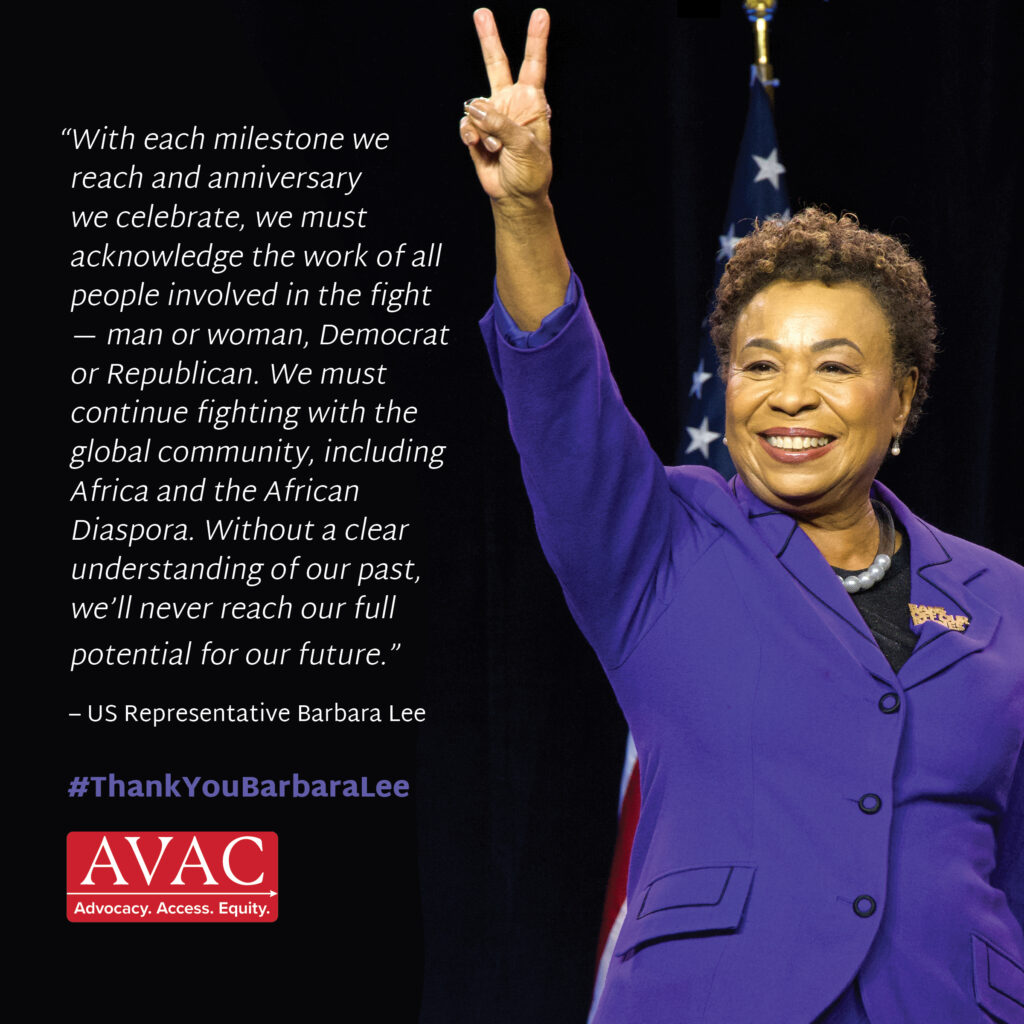The first quarter of 2024 ends with new research and questions on the future directions of STI vaccines and diagnostics. The Conference on Retroviruses and Opportunistic Infections (CROI) was the setting for positive news on the potential for early use of doxycycline to prevent STIs (DoxyPEP) in real-world settings and questions about its effectiveness in cisgender women given major evidence gaps. Important discussions and debates continued around the issue of antimicrobial resistance (AMR), as the field continues to grapple with the rollout of DoxyPEP. Presentations at CROI also highlighted the need for new diagnostics for syphilis as infections continue to increase globally and the need for STI advocacy efforts to ensure these infections get the attention and funding needed to develop vaccines and diagnostics that can prevent, detect, and treat these infections!
In January, the US Centers for Disease Control and Prevention (CDC) released the STI surveillance data from 2022, which showed an increase in chlamydia and syphilis cases from 2021. Gonorrhea cases decreased between 2021 and 2022 by 9%. Alarmingly, 2022 congenital syphilis cases increased by 30% from 2021, signaling an urgent need for novel prevention, treatment, and testing methods.
In Australia, a group of researchers published a response to the Australasian Society for HIV, Viral Hepatitis and Sexual Health Medicine’s October 2023 statement on the use of DoxyPEP in Australia. The authors point to the potential threat of increasing AMR and the urgent need to implement measures to monitor DoxyPEP use and its impact.
Read on for upcoming webinars, must-read resources supporting advocacy for improved funding and commitments for STI vaccines and diagnostics. Afterwards, test your knowledge with AVAC’s new STI Trivia quiz.
New Report! STIs: A Review of the 2022 Vaccine and Diagnostic R&D Pipeline and Investments
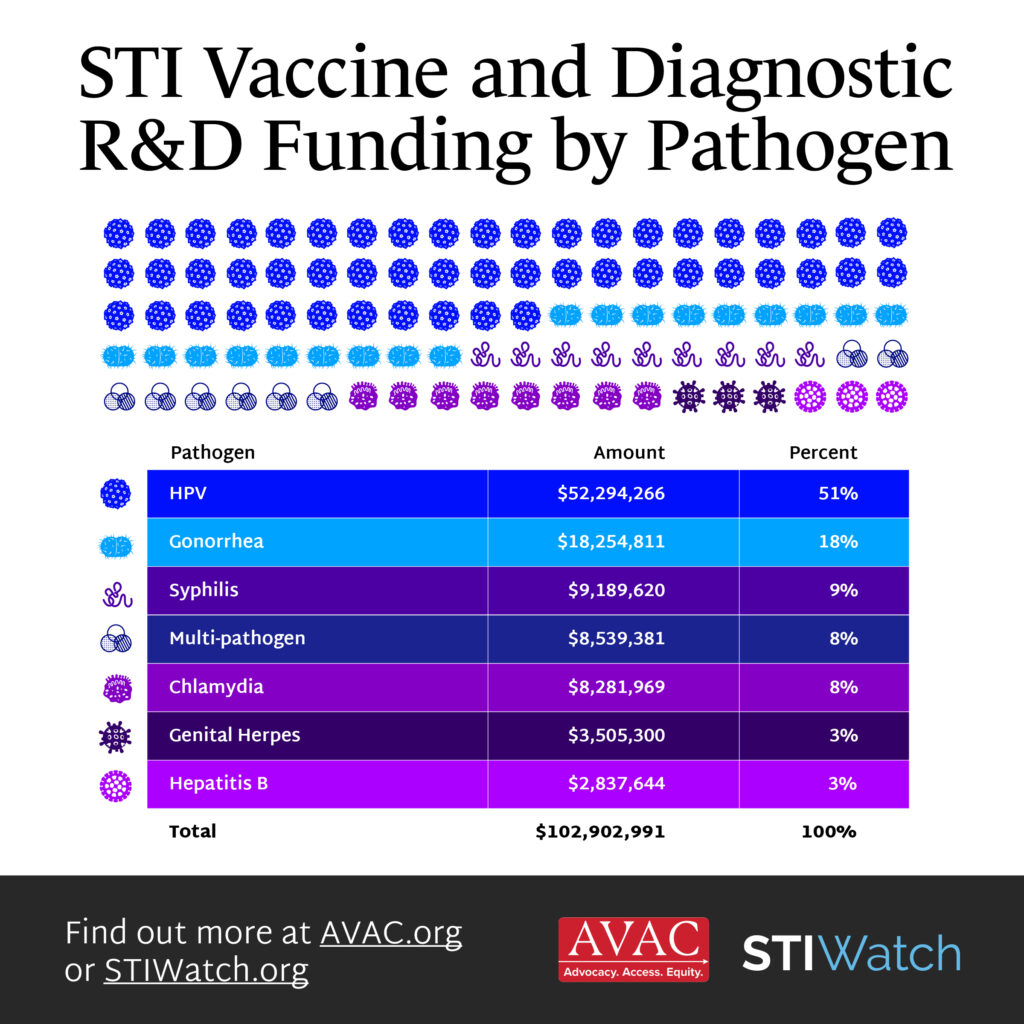
A new AVAC report tracks funding trends in vaccine and diagnostics R&D, and pipeline investments for some of the most common STIs, including chlamydia, genital herpes, gonorrhea, hepatitis B, human papillomavirus (HPV), syphilis, and trichomoniasis. The report finds that STI research remains underfunded and neglected compared to other infectious diseases. Read the report to learn more.
STI Advocacy Updates

AVAC spoke with two cervical cancer advocates, Tamika Felder and Karen Nakawala, in January as part of its cervical cancer webinar series. Felder and Nakawala are breaking taboos and saving lives by empowering people to share their stories of survivorship and senseless loss.
Felder, founder of Cervivor, Inc., was diagnosed with cervical cancer at 25, and turned her struggle into a mission, providing resources and a platform for those affected by the disease. Her impactful work and advocacy inspired Nakawala to found the Teal Sisters Foundation in 2020, following her successful treatment for cervical cancer. To learn more about Tamika and Karen, watch AVACs cervical cancer webinar. Thank you, Tamika and Karen for all that you do!
January 18 marked HPV Awareness Day. AVAC and TogetHER for Health released an updated call to action to improve HPV vaccination among people living with HIV. In total, 31 organizations signed on to this call, urging global leadership to increase access to lifesaving HPV vaccines for people living with HIV.
Upcoming Events
STI Awareness Week is April 14 – 20!
Join us for two webinars focused on syphilis and DoxyPEP. These webinars are intended for health care providers, civil society organizations, public health officials, and others working in the STI/HIV fields.
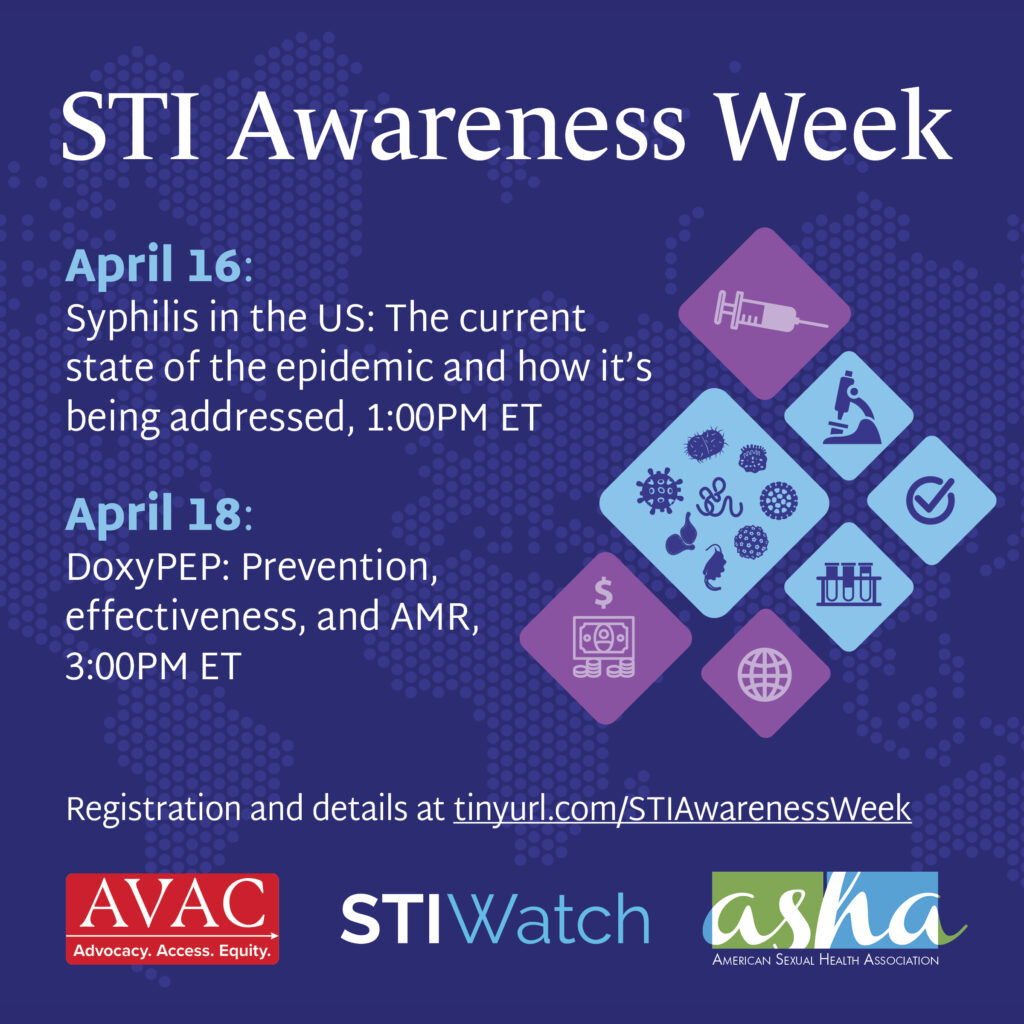
September 2024 STI Conferences
Registration is now open for two important STI conferences in September – which unfortunately are running concurrently in different parts of the world!
The 2024 STI Prevention Conference will bring 1,200 conference attendees to Atlanta, Georgia, from September 16-19, 2024. Abstracts are being accepted until March 29.
The 25th IUSTI World Congress will take place September 17-20, 2024, in Sydney, Australia, and provide an opportunity to meet, discuss and learn about the latest research and innovation in sexual and reproductive health.
What We’re Reading and Resources
- Testing, testing: the advancing diagnostics for sexually transmitted infections. Diagnostics are urgently needed to detect STIs and this article examines several that are on the horizon. A US-Based company, Qvin is developing the Q-pad, a diagnostic menstrual pad with a removable strip to identify signs of diabetes and symptoms of high-risk human papillomavirus. Daye, a UK based gynecological start-up, launched a diagnostic product that is a tampon with the ability to screen for STIs. These advancements are exciting and serve as a reminder that advocacy is needed to ensure these products get to the people who need them.
- CARB-X Funds Visyby Medical to Develop a portable rapid diagnostic for Gonorrhea Including Antibiotic Susceptibility Combating Antibiotic-Resistant Bacteria Biopharmaceutical Accelerator (CARB-X) will award up to US$1.8 million to biotechnology company, Visby Medical, to develop a portable rapid polymerase chain reaction (PCR) diagnostic to detect gonorrhea and its susceptibility to ciprofloxacin, a former frontline oral antibiotic that can no longer treat gonorrhea infections resistant to this medication. Funding will also support development of a test for gonorrhea, chlamydia, and trichomoniasis in men based on urine samples.
- Syphilis Complicating Pregnancy and Congenital Syphilis. This manuscript provides a review of syphilis during pregnancy and congenital syphilis. As syphilis and congenital syphilis infections continue to rise, novel approaches are needed to detect, prevent, and treat infections. Because syphilis disproportionately affects populations with limited access to healthcare, new and improved diagnostics and therapeutics will need to be embedded within a health framework that prioritizes equity to improve the diagnosis and treatment of congenital syphilis, a preventable disease.
- Near-to-patient-testing to inform targeted antibiotic use for sexually transmitted infections in a public sexual health clinic: the NEPTUNE cohort study. This study examines the effectiveness of a novel lateral flow assay for point-of-care detection of gonorrhea among people with symptoms. Lateral flow assays are tests that can detect the presence of proteins or antigens for specific infections, like COVID-19 and HIV. This test had excellent clinical sensitivity and specificity in detecting gonorrhea among male and female patients with symptoms. A test like this could provide an important tool to better detect infections in settings without direct access to laboratory testing and reduce overtreatment.
- Breaking Barriers in STI Clinical Management: Addressing Resistance Challenges and Incorporating New Diagnostic Approaches. This on-demand webinar features Dr. Van Der Pol and Dr. William Geisler who share their insights on crucial aspects of STI clinical management, focusing on resistance challenges and new diagnostic approaches.
To learn more about AVAC’s STI Program, visit STIWatch.org and avac.org/sti. Email [email protected] for questions or additional information. And to sign up for specific updates on STIs, click here.

